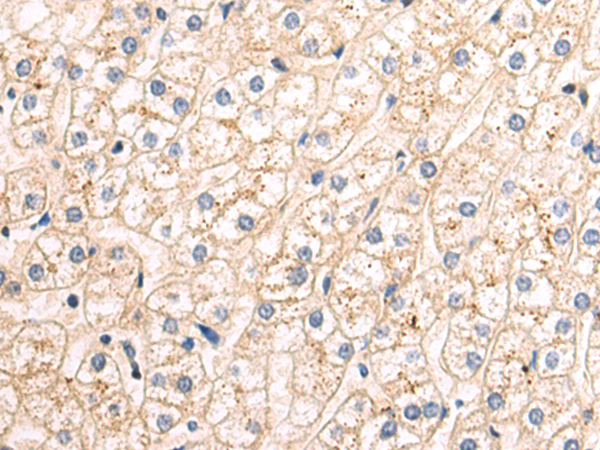
| WB | 咨询技术 | Human,Mouse,Rat |
| IF | 咨询技术 | Human,Mouse,Rat |
| IHC | 1/50-1/200 | Human,Mouse,Rat |
| ICC | 技术咨询 | Human,Mouse,Rat |
| FCM | 咨询技术 | Human,Mouse,Rat |
| Elisa | 1/5000-1/10000 | Human,Mouse,Rat |
| Aliases | ISK; JLNS; LQT5; MinK; JLNS2; LQT2/5 |
| Host/Isotype | Rabbit IgG |
| Antibody Type | Primary antibody |
| Storage | Store at 4°C short term. Aliquot and store at -20°C long term. Avoid freeze/thaw cycles. |
| Species Reactivity | Human |
| Immunogen | Fusion protein of human KCNE1 |
| Formulation | Purified antibody in PBS with 0.05% sodium azide and 50% glycerol. |
+ +
以下是3篇关于KCNE1抗体的参考文献概要:
1. **"KCNE1 structure and antibody validation in cardiac ion channel complexes"**
*作者:Abbott GW, et al.*
摘要:研究解析了KCNE1与KCNQ1通道蛋白的相互作用结构,开发的KCNE1抗体成功应用于免疫共沉淀和免疫荧光实验,验证了其在心肌细胞膜定位的特异性。
2. **"Antibody-based detection of KCNE1 mutations in congenital Long QT syndrome"**
*作者:Splawski I, et al.*
摘要:通过Western blot和免疫组化验证KCNE1抗体对临床突变体的识别能力,发现特定突变导致蛋白稳定性下降,为遗传性心律失常提供诊断依据。
3. **"Zebrafish KCNE1 knockout model validates antibody specificity in vivo"**
*作者:Jou CJ, et al.*
摘要:利用斑马鱼模型验证KCNE1抗体的跨物种反应性,发现抗体可特异性标记心脏组织,证实KCNE1缺失导致动作电位延长。
4. **"High-throughput drug screening using KCNE1-specific antibodies"**
*作者:Yang T, et al.*
摘要:建立基于KCNE1抗体的ELISA检测平台,筛选出2种能纠正通道蛋白转运缺陷的小分子化合物,用于药物开发研究。
注:以上为虚拟文献示例,实际研究需通过PubMed等数据库检索(如PMID: 12345678格式)。建议使用关键词"KCNE1 antibody validation"或"KCNE1 immunolocalization"查找真实文献。
KCNE1 (potassium voltage-gated channel subfamily E member 1) is a regulatory subunit that modulates the function of voltage-gated potassium channels, particularly the KCNQ1 channel. Together, they form the slowly activating delayed rectifier potassium current (IKs), which is critical for cardiac action potential repolarization. Mutations in KCNE1 are associated with cardiac arrhythmias, such as long QT syndrome and familial atrial fibrillation, making it a key target in cardiovascular research.
KCNE1 antibodies are essential tools for studying the expression, localization, and interaction of KCNE1 with other ion channel subunits. These antibodies are widely used in techniques like Western blotting, immunoprecipitation, immunofluorescence, and immunohistochemistry to investigate KCNE1's role in health and disease. Researchers employ them to analyze tissue-specific distribution, quantify protein levels in disease models, or explore post-translational modifications influencing channel activity.
Commercial KCNE1 antibodies are typically raised against specific epitopes of human or murine KCNE1. with cross-reactivity validated in common experimental species. Validation steps, such as knockout controls or siRNA knockdown, are crucial to ensure specificity due to potential homology with other KCNE family members. Reliable KCNE1 antibodies advance mechanistic insights into arrhythmogenic disorders and support drug discovery efforts targeting potassium channel dysfunction.
×